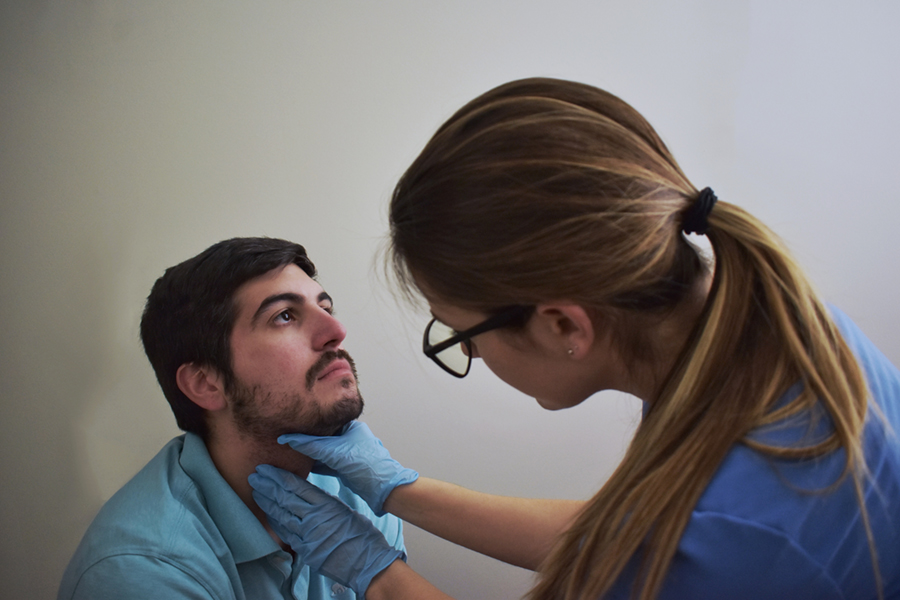Exploring Swallowing Disorders

Swallowing disorders, or dysphagia, can significantly impair one’s ability to eat and drink comfortably and safely. Contrary to popular belief, dysphagia or trouble swallowing is not a condition in itself, but rather a symptom of various medical conditions. Southern Indiana ENT Sinus & Allergy in Columbus, IN, is here to help you understand the symptoms, causes, and dysphagia treatment options.
What Is Dysphagia?
Dysphagia is the medical terminology used to describe trouble swallowing. Swallowing is facilitated by muscle and nerve coordination, and when these bodily functions become compromised, an individual may experience a decline in their ability to swallow. Dysphagia can occur in all three stages of swallowing, including oral, pharyngeal, and esophageal.
Causes of Trouble Swallowing
Various medical conditions, disorders, and diseases can lead to swallowing disorders. Medical professionals separate different swallowing disorders into three types, including:
- Oral Dysphagia – Mouth problems, including tongue weakness, weakness when chewing, or neuromuscular inefficiencies.
- Oropharyngeal Dysphagia – Throat problems due to muscular or neurological problems.
- Esophageal Dysphagia – Esophagus problems caused by blockages, compression, pouches, or muscular issues.
Conditions That Cause Swallowing Disorders
Swallowing disorders can derive from several different things. The common reasons for dysphagia symptoms include the following:
- Esophageal motility problems (muscle weakness)
- Structural abnormalities, narrowed esophagus, growths, or tumors
- Neurological conditions, including Parkinson’s disease, stroke, and more
- Eosinophilic esophagitis (allergies)
- Acid reflux scarring
- Infection
Dysphagia Symptoms
Trouble swallowing is the main symptom of dysphagia. However, difficulty swallowing is often accompanied by several other symptoms, including:
- Choking or coughing when drinking or eating
- Food coming back up through the mouth or nose
- The feeling that food is caught in your throat or chest
- Excessive or persistent drooling or saliva
- Recurring respiratory infections
- Pain or discomfort
Diagnosing Dysphagia

Swallowing disorders stem from an array of different conditions, diseases, and disorders. Diagnosing these concerns requires a comprehensive overview of the patient’s medical history followed by a physical examination. Depending on the patient’s symptoms, medical professionals may refer the patient to pursue various forms of further testing that involve the ear, nose, and throat.
Dysphagia Treatments
Dysphagia treatment varies depending on the type and cause of a patient’s swallowing disorder. Upon a thorough physical exam and comprehensive testing methods, dysphagia may be treated with the following:
- Language and speech therapy
- Altering the types of foods and liquids you ingest to promote safe swallowing
- Feeding tubes in the nose or stomach
- Surgical procedures to open the passageway of the Oesophagus
Choose Southern Indiana ENT Sinus & Allergy
The medical professionals at Southern Indiana ENT Sinus & Allergy are here to help you get back to living comfortably and safely. With state-of-the-art equipment and a wealth of experience, we are known for our prompt diagnosis and treatment of various swallowing disorders. Rely on us for the highest standards of compassionate care.
Find Relief for Your Swallowing Disorder Today
If you are experiencing trouble swallowing, Southern Indiana ENT Sinus & Allergy is here to help. Allow our trusted medical professionals to address, diagnose, and alleviate your swallowing concerns, getting you back on track. Contact us today to schedule an appointment with our dysphagia specialists.

